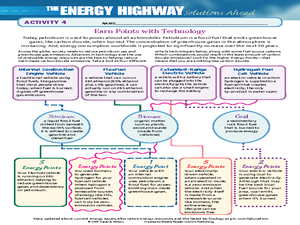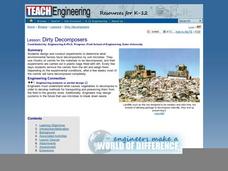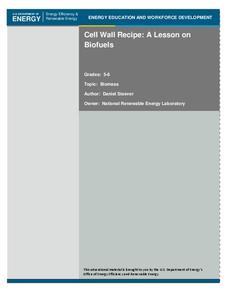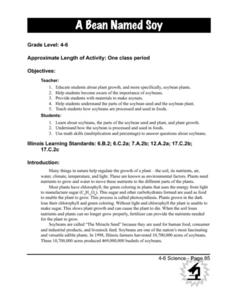Curated OER
Earn Points with Technology
Students explore renewable energy by analyzing a diagram. In this fossil fuel activity, students view a chart explaining the different energy consumption from automobiles and how they impact our environment. Students analyze a point...
Curated OER
Oil Consumption
Students explore the concept of environmental stewardship. In this science lesson, students calculate the barrels of oil that their family consumes in a year.
Curated OER
Lesson for the EasyJet Set
Students take a closer look at the environmental costs of flying. In this current events lesson, students research the noted Web sites regarding the Airbus, noise pollution, and oil use associated with airline travel. Students brainstorm...
Curated OER
Energize Your Future
Students consider the positive and negative aspects of alternative energy. In this physical science lesson plan, students consider the sources of energy they use everyday. Students compare alternative sources of energy and complete a...
Curated OER
Simple Machines
First graders discuss work, force, and energy. They study how work is done. Students discuss various types of work that are done. They act out how work is done. Student draw pictures of types of work they have done.
Curated OER
Where Did The Electricity Go?
Ninth graders identify problems and research potential solutions regarding the efficiency of energy use. They examine the potential problems associated with the use of electrical appliances. They brainstorm about practical problems...
Curated OER
Sustainable Choices
Students examine energy use and the different construction materials used in their home. In this sustainable choices lesson students study different materials and what a sound environmental choice would be.
Curated OER
Sun and Temperatures
Students consider the relationship of temperature to environmental conditions and then apply their knowledge to a practical event. The task assesses students' knowledge and application of that knowledge to an additional situation.
Curated OER
Dirty Decomposers
Seventh graders design and conduct experiments to determine what environmental factors favor decomposition by soil microbes. They use chunks of carrot for the materials to be decomposed, and their experiments are carried out in plastic...
Curated OER
Materials, Let's Do the Life Cycle
Students examine environmental and social impacts of products that consumers buy. In this environmental stewardship lesson, students play a game that requires them to consider real costs of products. Students consider the environmental...
Curated OER
A Cleaner Today for a Greener Tomorrow
Pupils examine recycling efforts. In this environmental stewardship lesson, students trace recycling efforts and script a skit regarding incandescent light bulbs' effect on the environment.
Curated OER
Electromagnetic Spectrum
Students define electromagnetic radiation, list major categories and uses of electromagnetic waves, identify potential health risks with electromagnetic waves, and demonstrate understanding of Plank's constant by solving quantitative...
Curated OER
Scientist Tracking Network
Students correlate surface radiation with mean surface temperature of several geographic regions. They observe how these parameters change with latitude and construct an understanding of the relationship of solar radiation to seasonal...
Curated OER
Solar Energy: Become a Sun Chef!
Pupils design and construct a solar cooker. They use the Internet to research solar collectors and the process of changing light energy into heat energy.
Curated OER
Heat from Light
Second graders explore solar energy. In this science lesson, 2nd graders use hand lenses to see that light energy can be converted to heat energy.
Curated OER
Cell Wall Recipe: A Lesson on Biofuels
Biotech engineers discover that changes in the DNA code for cell wall formation can help create crops better suited for biofuel production. They extract DNA from wheat germ. They decode paper strips with codes and relate the activity to...
Curated OER
Permit Trading
Emerging environmentalists work in groups and pretend that each is a power company generating electricity for a community. They consider the costs of building a renewable electricity generator that will increasingly replace generating...
Clean Up Australia
Why are Batteries Harmful to the Environment?
Open this lesson by reading together about primary and secondary batteries (such as nickel-cadmium cells), problems they can cause in the environment, and how humans can minimize the damage. Afterward, little ones examine a collection of...
Curated OER
Urban Ecosystems 2: Why are There Cities? A Historical Perspective
Second in a series of five lessons, this lesson encourages preteens to consider cities as urban ecosystems. First, they keep a food diary for a few days. They visit the Natrional Agricultural Statistics Service website for current data...
Curated OER
Soybeans: The Miracle Seed
Students discover why soybeans are called the "miracle seeds." They make their own soynuts and share other foods made from soybeans. They create a bulletin board of soybean products.
Rustle Leaf
Tell Someone About Earth Day
Celebrate Earth Day by spreading the word of conservation. Teach children ten easy ways to help preserve the Earth and share this knowledge with others by sending e-cards and printable cards to loved ones. Extend learning about the...
Curated OER
Environmental Issues in South Carolina
Students research governmental agencies that deal with the environment and chart aspects about each agency. They role-play a city council meeting to address the topic of building a waste to energy facility.
Curated OER
Transformation of Energy-8th Grade
Eighth graders examine how electricity is produced in relation to the atom as well as what causes electric current to flow and what determines how much current flows through a circuit. These and other concepts of transformation of energy...
Curated OER
Wetland Ecosystem Conservation
Students read articles about wetland ecosystem conservation in Florida and other countries. They summarize information found in the articles. Students reflect on the information in the articles and write their feelings.

























